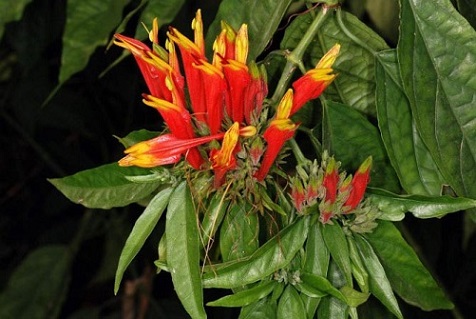Thailand medical researchers find that extracts of Clinacanthus Nutans Lindau can inhibit dengue virus
Kittisak Meepoon Fact checked by:Thailand Medical News Team Jul 31, 2024 1 year, 6 months, 2 weeks, 13 hours, 36 minutes ago
Thailand Medical: Thailand's battle against dengue fever has taken a promising turn with the discovery that extracts from the traditional medicinal plant Clinacanthus nutans Lindau can inhibit the dengue virus. This exciting development stems from extensive research conducted by scientists from Chiang Mai University and Kasetsart University. This
Thailand Medical news report delves into the study's findings and their potential implications for dengue treatment.
 Thailand medical researchers find that extracts of Clinacanthus Nutans Lindau can inhibit dengue virus
Dengue Fever: A Persistent Threat
Thailand medical researchers find that extracts of Clinacanthus Nutans Lindau can inhibit dengue virus
Dengue Fever: A Persistent Threat
Dengue fever, caused by the dengue virus (DENV), poses a significant global health challenge, particularly in tropical and subtropical regions. The World Health Organization estimates that there are approximately 390 million dengue infections annually, with Asia bearing the brunt of the disease burden. The virus, transmitted through the bite of infected Aedes mosquitoes, can cause symptoms ranging from mild fever to severe dengue hemorrhagic fever and dengue shock syndrome, which can be fatal.
Traditional Medicine Meets Modern Science
Clinacanthus nutans (Snake grass), known locally in Thailand as "Phaya Yor," has been used in traditional Thai medicine for its anti-inflammatory and antiviral properties. The plant is part of Thailand’s national list of essential medicines. The recent study aimed to explore whether extracts from this plant could offer a new weapon against the dengue virus.
The Research
The study was a collaborative effort involving researchers from the Department of Biology, Faculty of Science, Chiang Mai University; the Doctoral of Philosophy Program in Applied Microbiology (International Program), Faculty of Science, Chiang Mai University; the Cell Engineering for Cancer Therapy Research Group, Faculty of Science, Chiang Mai University; the Graduate Master’s Degree Program in Biology, Faculty of Science, Chiang Mai University; and the Department of Biochemistry, Faculty of Science, Kasetsart University.
The research team tested the antiviral activity of Clinacanthus nutans extract on DENV-2, one of the four serotypes of the dengue virus. They used the Huh7 hepatocellular carcinoma cell line for their experiments, focusing on how the extract affected viral infection and inflammation.
Key Findings
Inhibition of Viral Infection
One of the most significant findings was that Clinacanthus nutans extract effectively inhibited the dengue virus during the early stages of infection. The extract showed the highest efficiency when added during the co-infection step, significantly reducing the viral antigen concentration. At a concentration of 31.25 µg/mL, the extract lowered the viral antigen concentration to 22.87%, demonstrating its potent antiviral properties.
Impact on Virus-Host Interaction
The study also revealed that the extr
act greatly inhibited the virus after it had bound to the host cells. This suggests that the extract interferes with the virus's ability to establish an infection, highlighting its potential as a preventative treatment.
Anti-Inflammatory Effects
Beyond its antiviral activity, Clinacanthus nutans extract also exhibited strong anti-inflammatory properties. The researchers found that the extract significantly reduced the expression of pro-inflammatory cytokine and chemokine genes, including TNF-α, CXCL10, IL-6, and IL-8, which are typically elevated during dengue infection. Moreover, the extract decreased the activation of the NF-κB signaling cascade, which is crucial for inflammatory responses.
The Role of Gallic Acid
The researchers identified the phytochemical gallic acid as a major bioactive compound in the Clinacanthus nutans extract, which might be responsible for its antiviral properties. High-performance liquid chromatography (HPLC) analysis confirmed the presence of gallic acid, and further studies demonstrated its ability to inhibit viral infection and reduce inflammation.
Implications and Future Directions
The findings of this study are significant for several reasons. Firstly, they provide scientific validation for the traditional use of Clinacanthus nutans in treating viral infections. Secondly, the dual antiviral and anti-inflammatory properties of the extract make it a promising candidate for developing new treatments for dengue fever.
However, the researchers emphasize that more studies are needed to fully understand the mechanisms through which Clinacanthus nutans extract inhibits the dengue virus and to evaluate its effectiveness in clinical settings. Future research could involve animal models and eventually human trials to confirm these findings and develop effective dosage guidelines.
Conclusion
The discovery that Clinacanthus nutans extract can inhibit the dengue virus and reduce inflammation offers new hope in the fight against dengue fever.
This breakthrough, published in the peer-reviewed journal: Antibiotics, underscores the potential of combining traditional medicinal knowledge with modern scientific research to address global health challenges.
https://www.mdpi.com/2079-6382/13/8/705
For the latest on Dengue Research, keep on logging to
Thailand Medical News.
Read Also:
https://www.thailandmedical.news/news/thailand-medical-authorities-promote-thai-traditional-medicine-as-first-line-of-treatment
https://x.com/ThailandMedicaX/status/1817063769199247731
https://www.thailandmedical.news/news/thailand-medical-researchers-discover-phytochemicals-from-orchid-roots-that-can-be-used-to-fight-diabetes
